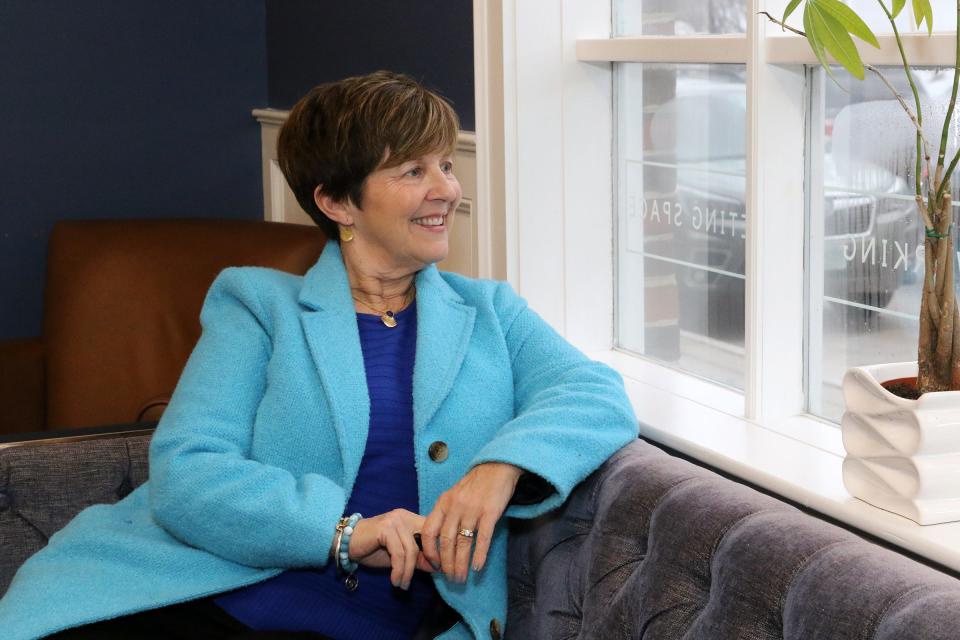Does your workplace help with mental health? Here's how some NH businesses have stepped up
- Oops!Something went wrong.Please try again later.
Fidelity Investments expanded its internal offerings for free therapist sessions.
Manufacturer Hypertherm saw enrollment in its employee assistance program triple.
And Riverbend Community Mental Health set up "peer discussion groups” via Zoom for employees to share their concerns with outside clinicians.
Many employers across New Hampshire added or advertised existing mental health services as their workers coped with increased stress and isolation while working remotely or in reconfigured offices during the coronavirus pandemic.
The altered world ushered in a stronger emphasis on mental well-being in the workplace.
“The reality is COVID has had a profound impact on people’s mental health,” said Susan Stearns, executive director of National Alliance on Mental Illness-New Hampshire.
Stearns called the pandemic a “collective societal traumatic event.”

“One thing isolation has really reinforced is we are social creatures,” Stearns said. “A lot of social interaction happens in the workplace, right?”
The pandemic transformed how workers completed their tasks and interacted with one another.
Nearly 1 in 5 U.S. workers rated their mental health as fair or poor in a Gallup poll conducted last summer – and were absent from work more often.
Editor's note: This is the ninth story in a year-long mental health series in a partnership between Seacoast Media Group, The Union Leader and Dartmouth Health.
“Projected over a 12-month period, workers with fair or poor mental health are estimated to have nearly 12 days of unplanned absences annually compared with 2.5 days for all other workers,” Gallup said.
The missed work costs the U.S. economy an estimated $47.6 billion annually in lost productivity.
Four of 10 U.S. workers reported that their job has an extremely negative (7%) or somewhat negative (33%) impact on their mental health, Gallup said.
At Riverbend Community Mental Health in Concord, management also rented chair massagers several times for their 400-person workforce to take breaks.
“It gave people a sense of a dedicated half-hour of their day to have self-care on us,” said Jaime Corwin, vice president of human resources. “That has been so popular, we’re going to try and do that twice a year.”
Feel the urge to 'quiet quit'? Time to check in with your mental health, experts say
No age group immune to mental health issues
Workplace-related mental health issues aren't confined to any one generation.
Sandy Demarest has seen older workers experience feelings of anxiety, stress and fear during the pandemic.
“Because of anxiety in return to in-person working, many older workers in theory prefer working remotely,” said Demarest, a mid-career and retirement coach at Demarest Directions in Milford.
“On the flip side, loneliness and isolation are at an all-time high for those later in life,” she said. “So by working remotely, the benefit of connection through work takes on a new look and feel.”

Some employers are challenged in finding the right balance of making workers feel safe, healthy and engaged, she said.
Some older workers have changed direction.
“Many of my clients have retired early and are putting a new focus on entrepreneurial options,” Demarest said. “Though there can be risk involved, they believe there are also risks in staying in a company that is not addressing the above challenges. With people living longer and working longer, evaluation by both employer and employee is important to forge the best path forward.”
Younger workers also struggle with loneliness.
Stay Work Play, an organization that works to attract and retain young residents in New Hampshire, has data that even before the pandemic, 21% of young Granite Staters reported "being lonely, saying they had no friends or family members in close proximity," said Will Stewart, the group's executive director.
“That sense of loneliness and isolation has only seemed to increase during the pandemic as work from home has become more widespread,” Stewart said.
Younger residents, however, seem more open to seeking professional help.
“We are certainly hearing young workers talk more about mental health in recent years. There seems to be less of a stigma with Millennials and Gen Z in particular with not just publicly discussing their mental health challenges, but also in seeking professional help via therapy,” Stewart said.
“More and more employers are acknowledging the mental health needs of their employees, but most are still trying to figure out how to best support these needs,” Stewart said.
“I don’t see all that many employers that have established support systems within the workplace,” said Stewart, who hears people experiencing difficulties about getting appointments for mental health services. “I think younger employees are more apt to discuss their challenges with their peers in person or on social media, but that this sort of peer support decreases with age.”
'I wish I could live a normal life': What your friend with an anxiety disorder wishes you knew
He hopes to humanize the issueCarson Daly says he's suffered from anxiety, panic attacks on 'The Voice'
More need for counseling and mental health days
Advocates encourage more people to get professional help.
“It puts a real strain on the system because we have more people seeking care,” NAMI's Stearns said recently.
“The reality is before COVID we had a mental health crisis on our hands and it’s only been exacerbated,” Stearns said. “I say that because we had a workforce shortage prior to COVID. COVID made it worse.”
Corwin at Riverbend acknowledged the issue.
“There are definitely wait lists all over the state for mental health services, but I think the wait time has a lot of variables, so I really couldn't say what an average would be,” Corwin said.
“We’re seeing more and more employers where they are specifically (saying) paid time off can be used as a mental health day,” Stearns said.
Employers can offer relief to employees who might need a day off for stress or anxiety.
That will “help break down the stigma,” she said.
Kicking the Stigma:Scars of Irsay family’s mental health issues run deep. So they share to heal, help.
Stearns said she sees more employers reaching out to her organization for training on how to respond to employees who “think their employer has a role to play in solving mental health problems.”
Fidelity Investments, which employed more than 7,000 New Hampshire-based workers as of October, set aside two “quiet rooms” for reflection on the Merrimack campus, said spokesman Stephen Austin.
Some workers also are eligible to work with a wellness coach for free.
The financial services firm also added more walking trails and a bike-sharing program.
“Fidelity recognizes that the mental health landscape has evolved significantly over the past couple of years, and as such, we continue to keep an eye on evolving offerings to ensure we offer the best support to our associates and their loved ones,” Megan Bourque, head of benefits for Fidelity, said in an email.
Concern rises at all levels, from federal government to local companies
The mental health of workers was an important enough subject for the federal government to issue a report.
“The U.S. Surgeon General’s Framework for Workplace Mental Health & Well-Being” said the pandemic changed the nature of work and how workers relate to their jobs.
“The pandemic also sparked a reckoning among many workers who no longer feel that sacrificing their health, family, and communities for work is an acceptable trade-off,” the report said. “Organizations are also increasingly aware of another trade-off: when the mental health of workers suffers, so does workplace productivity, creativity, and retention.”
Stress can increase a person's risk for diabetes and other chronic health conditions. Chronic stress also has been linked to a higher risk of developing diseases, such as high blood pressure, high cholesterol, heart disease, obesity, cancer and autoimmune diseases, according to the report.
What is job burnout? It starts with work and while self-care can help, it isn't just your problem to solve
COVID's 'silver lining': Research breakthroughs for chronic disease, cancer and common flu
It suggested more employee autonomy related to how work is done, increased access to paid leave, providing a living wage and building a culture of gratitude and recognition.
Hypertherm, which employs 1,100 in the Upper Valley and 1,900 globally, saw the number of workers using its employee assistance program triple from 2019 to 2021. The program provides free, confidential mental health treatment over the phone for employees and their family members, as well as access to other resources for help with other issues.
“This could be from an increased need, or it could be that there is greater awareness and, therefore, more acceptance to access support resources for issues such as depression, anxiety, and substance use disorders,” said Jim Rowe, senior director of HR Centers of Excellence at Hypertherm.
“We see the fact that people are seeking treatment and services as positive, and we are glad that we have built strong partnerships with benefits partners and community organizations who provide these vital services,” Rowe said.
Best ways to help someone with suicidal thoughts
Psychotherapist Stacey Freedenthal knows about people with suicidal thoughts.
She tried to kill herself twice about three decades ago when she was in her 20s.
“My mind was in a real bad place,” Freedenthal said during a video interview from Colorado, where she lives. “I truly thought that my parents would be relieved of a burden.”
Today, Freedenthal is nationally recognized for her expertise in helping people who struggle with their mental health and who have suicidal thoughts.
“I think it’s given me insight and empathy into the suicidal experiences I would not have had (otherwise),” Freedenthal said.
Help support quality local journalism like this. Subscribe today.https://subscribe.seacoastonline.com/offers
She is the author of new book out this month: “Loving Someone with Suicidal Thoughts: What Family, Friends, and Partners Can Say and Do.”
“One of its main messages is to be able to listen without immediately trying to talk someone out of their feelings or immediately cheer them up or change their mind,” Freedenthal said.
“We know that people with suicidal thoughts are more likely to confide in friends and family than to go to a mental health professional,” Freedenthal said
“Some people will disagree with me on this, but I think that you should not call the police unless you absolutely need to,” she said.
What could I have done and why didn’t I?My twin died by suicide. I’ve been too ashamed to talk about it – until now.
“I think that can do more harm. It can inhibit the person from confiding in others moving forward, so I would recommend unless the person is on verge of taking action to end their life or they already have done something like, for example, overdosed on pills, unless they truly are in immediate danger, I think having a conversation is what’s important.”
Freedenthal, the mother of a young adult son, said she is concerned about today’s young people.
“Their lives are much harder than they were when I was a young adult and I still got suicidal.”
Read the full series on mental health in New Hampshire
This article originally appeared on Portsmouth Herald: NH businesses help with employee mental health as awareness rises

